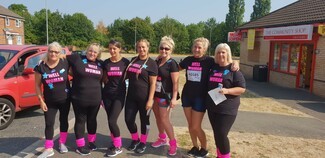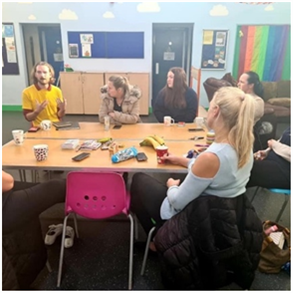Mental health services must improve for Gypsies and Travellers – says new report

A research team tasked with finding best practice mental health services for Romany Gypsy, Roma and Traveller people has managed to find six positive examples – and they were all run by Traveller charities.
The research, funded by the NHS Race and Health Observatory, was led by Dr Peter Unwin at the University of Worcestershire, in partnership with voluntary organisations including GATE Herts and the Gypsy, Roma, and Traveller Social Work Association. The research team was tasked with finding examples of best practice in mental health services for Gypsy, Roma and Traveller people, rather than just reporting back about how bad things were.
The research team was made up of an equal balance of researchers from Gypsy, Roma, and Traveller Backgrounds along with academic researchers and work was carried out during 2022 to 2023.
Josie Driscoll from GATE Herts said “Gypsies, Roma and Irish Travellers are known to face some of the starkest inequalities in healthcare access when compared with other minority ethnic groups. Barriers faced when accessing health care services included difficulties registering with GP’s, poor staff attitudes and a lack of trust in services because of previous experiences.”
Dr Peter Unwin of University of Worcester spoke about the aims and findings of the report and gave Travellers Times the following statement:
“The team struggled to find good examples of mental health practice but despite plenty of tales about discrimination and no service, we persevered and identified six positive services run by Gypsy, Roma, and Traveller organisations. The services that the research team visited were in Hertfordshire, Leeds, Lincolnshire, York, Cambridgeshire and Dublin, Ireland.
The positive factors for community members found in the above areas mental health services were:
- The closeness of working relationships between the local Gypsy, Roma and Traveller organisation and key local health staff.
- Evidence that there was already knowledge in that service about Gypsy, Roma, and Traveller ways of life.
- A presence of a community member/s somewhere in that service.
- A service that gave a choice of individual, as well as group support
- Staff members that ‘stuck around ‘
- Drop-in services that did not need appointment/long waiting times.”
Moving forward and looking at the outcome that this report may have on leading best practice forward for better mental health outcomes for Gypsy, Roma and Traveller communities, Dr Peter Unwin concluded;
“The NHS Race and Health Observatory want this report to lead to real change and there are plans to engage Gypsy, Roma, and Traveller organisations to make some videos about the work plus a series of meetings are being set up with senior mental health professionals to chase progress on the report’s recommendations. The main recommendations are:
- That all mental health staff should receive training about the realities of Gypsy, Roma, and Traveller Life.
- That all mental health organisations should demonstrate that Gypsy, Roma, and Traveller people are part of their service.
- More voluntary organisations led by Gypsy, Roma and Traveller Communities should be started up with help from local councils.
- Women’s groups should be encouraged to develop across the country.
- Men must also be reached out to by services and new ways of getting men to talk about mental health should be explored through new funding.
- The shame around mental health in Gypsy, Roma and Traveller communities could also be made less if these cultures were more celebrated using arts, music and dance.
Case Study: Gainsborough Well Woman Group, Lincolnshire

Having active involvement in this research and being one of the co-authors I was excited to be part of the work within this report. In 2022 I went on a research trip with Dr Peter Unwin to Lincoln to visit the Gainsborough Well Woman Group. This group brings together Traveller Women and Non-Traveller Woman together in a united way. From carrying out focus group discussions around mental health with these ladies, I learned that this group is a vital support for each other that fights loneliness and isolation.
To support the community with health needs there are health professionals who join the group to offer practical advice around not just mental health but also around cancer awareness, weight management and healthy eating, to name a few.
This group also offers the women the opportunity to exercise together and take part in training courses such as first aid and health and safety.
Meeting this group and learning more about Lincolnshire Traveller Initiative just showed up the reality of how if every area of the UK had funding for a Traveller service with groups like this giving practical help this would help our community progress and have positive mental health outcomes.
The full report is available at Inequalities in Mental Health Care for Gypsy, Roma, and Traveller Communities, Identifying Best Practice - NHS – Race and Health Observatory (nhsrho.org)
By Stacey Hodgkins/TT Vision
(Photographs courtesy of Lincolnshire Traveller Initiative. Lead photograph caption: Gainsborough Well Woman group, Lincolnshire, is bringing Traveller and non-Traveller women together to keep healthy and to take part in good causes. Photograph from 2018.)